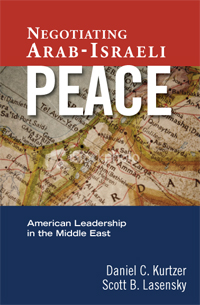Negotiating Arab-Israeli Peace Online Press Kit
Steep Decline in Arab-Israeli Peace Process Can Be Reversed: Long-term American Commitment Is Key, Says New Book
Negotiating Arab-Israeli Peace: American Leadership in the Middle East by Daniel C. Kurtzer and Scott B. Lasensky
For Immediate Release: February 2008
Contact: Meaghan E. Pierannunzi
Marketing Coordinator
Publications Office
United States Institute of Peace
1200 17th Street NW, Suite 200
Washington, DC 20036
P: 202-429-4736
F: 202-429-6063
E-mail: mpierannunzi@usip.org
Washington, D.C. — President Bush’s recent attempts to reinvigorate the Middle East peace process will fail unless his administration pays more attention to lessons learned in past negotiations, say Daniel C. Kurtzer, former U.S. ambassador to Egypt and Israel, and Scott B. Lasensky, Middle East expert at the United States Institute of Peace (USIP). The authors of the new book Negotiating Arab-Israeli Peace: American Leadership in the Middle East conclude that there can be no endgame, two-state solution to the Arab-Israeli conflict without the United States playing an active role in spurring the negotiations.
"The absence of American leadership during this administration, combined with a blatant disregard for what worked in the past, has harmed American national interests and set back the quest for peace. Yet our research shows that no other third party has the kind of influence that the U.S. has in Arab-Israeli negotiations," says Kurtzer. "In fact, over the last 40 years, the peace process has never moved forward in a meaningful way in the absence of U.S. leadership."
"No one can deny that the intensification of the conflict has destabilized the region and hamstrung America's position post-9/11," says Lasensky. "Without continuous, constructive engagement, the United States jeopardizes many of its own security and foreign policy goals. But the decline in American diplomacy has been a relatively recent phenomenon, and it can be reversed. Our country’s influence remains substantial, and there are many past American achievements that can be the basis for a new starting point."
With the clock running out on the Bush administration and its efforts to forge a Middle East peace, Kurtzer and Lasensky offer ten core lessons as well as policy recommendations to guide the current and, more likely, future administrations in future negotiations.1 The next president must establish the Middle East peace process as a priority early in the administration and must convince all parties that Washington is committed to resolving the conflict. "Winning back the hearts and minds of both Arabs and Israelis must be a top priority, but it can only be the beginning. If the United States does not make the effort on a sustained basis, we cannot expect others to fill the gap, and the situation will only deteriorate in the long term," Kurtzer says.
Negotiating Arab-Israeli Peace is the culmination of the work of the Study Group on Arab-Israeli Peacemaking, convened by USIP in 2006–07. Led by Kurtzer and anchored by Lasensky, William B. Quandt (University of Virginia), Steven L. Spiegel (UCLA), and Shibley Telhami (University of Maryland and the Brookings Institution), the study group conducted confidential interviews in the United States, Europe, and the Middle East with 100-plus negotiators, political figures, and civil society leaders, virtually every key participant from all sides of the conflict.
In addition to grading recent administrations’ efforts to engage Israelis and Palestinians and prioritizing steps for current and future administrations, Negotiating Arab-Israeli Peace includes primary source documents, maps, and a timeline of regional events since 1967.
1. Kurtzer and Lasensky’s views do not necessarily represent those of the U.S. Institute of Peace, which does not take policy positions.
The United States Institute of Peace is an independent, nonpartisan institution established and funded by Congress. Its goals are to help prevent and resolve violent international conflicts, promote post-conflict stability and development, and increase conflict management capacity, tools, and intellectual capital worldwide. The Institute does this by empowering others with knowledge, skills, and resources, as well as by directly engaging in peacebuilding efforts around the globe.


